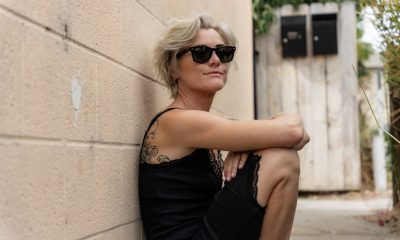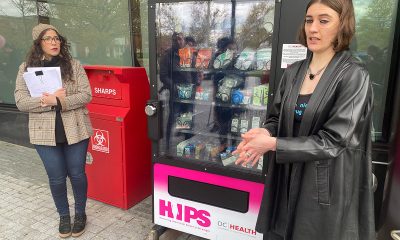Arts & Entertainment
No LGBTQ role or film winners at 75th Golden Globes, despite multiple nominations
But thanks to Oprah, #metoo movement soars
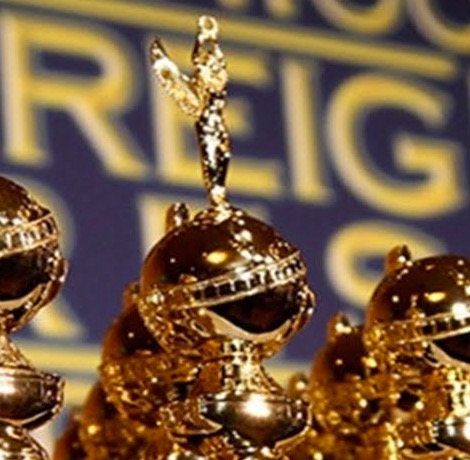
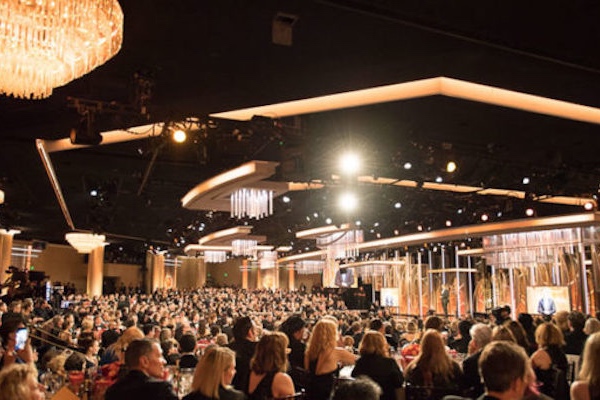
Start of the 75th Golden Globes live from the Beverly Hilton Jan. 7, 2018.
The 75th anniversary Golden Globes featured Hollywood actors donning all-black gowns and suits, and wearing #TimesUp pins in support in of those who have spoken out about sexual harassment and to protest gender inequality. It was a hugely important night celebrating women and women’s stories.
But many in the LGBTQ community were left puzzled by the lack of representation among the acting, directing and screenwriting category nominees and winners, even though #TimesUp resonates against homophobia too.
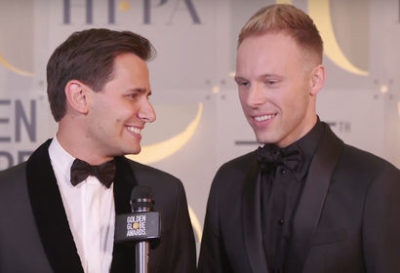
Gay men Benji Pasek, Justin Paul won for Best Original Song, with “This Is Me” in “The Greatest Showman. (Photo courtesy Golden Globe Winners Stage)
While “Handmaid’s Tale” and “Lady Bird” (both LGBTQ-themed projects) picked up awards, and there was a big win for Benji Pasek for Best Original Song, with “This Is Me” in “The Greatest Showman,” the night was entirely bereft of awards for LGBT roles, themed films or out actors.
D.C.-based film critic and the founder of Cinema Siren, Leslie Combemale says the omission of out lesbian, gay and trans actors among the nominations is not unlike the traditional silencing of women in the industry that led to the current crisis.
“It’s just a group of underrepresented people in the entertainment world that Hollywood doesn’t believe is capable of performing on that level… which is crazy,” Combemale told the Los Angeles Blade.
“Look at the film, ‘Fantastic Woman,’” she says. “Here’s an example of a great transgender actor [Daniela Vega] with an amazing performance who wasn’t even nominated.”
Combemale went on to step to tread delicate waters, pointing out that many in Hollywood have remained closeted and that they are at fault here.
“Until more gay roles become available to openly gay actors, then that’s going to continue to be part of the problem — people not feeling confident about being their true selves in that environment,” she says.
John Paul King, Los Angeles Blade film critic says, “There were a lot of excellent and diverse films nominated this year, and of course all the winners deserved to take home their prizes. And I think the fact that both Best Picture winners were very muchdriven by a female perspective – even though “Three Billboards” was written and directed by a man – was very telling.”
Beyond LGBT issues, it was not an entirely challenged event on the diversity front, however.
In a historic moment, actor Sterling K. Brown, star of the TV series “This is Us,” won for Best Lead Actor in a TV Drama. He was the first Black actor to win in this category. Last year, he won Best Supporting Actor in a TV Drama for his role in “The People v. O. J. Simpson: American Crime Story.”
But it was Oprah Winfrey’s speech that was the highlight of the evening. The media mogul, actress, and producer, was honored with the Cecil B. DeMille award. She is the first black woman to win.
Doing what she does best — inspiring and empowering — Winfrey talked about her own inspiration remembering when Sydney Poitier become the first Black man to win an Oscar in 1964 for “Lilies of the Field.” And what it meant to her as a little girl.
“Up on the stage came the most elegant man I had ever seen,” she recalled. “I had never seen a black man recognized like that before. What a moment like that means to a little girl, a kid watching from the cheap seats, as my mom came through the door, bone-tired from cleaning other people’s houses,” Oprah said in her acceptance speech.
“There are some little girls watching as I become the first black woman to be given this award,” she went on.
Winfrey recalled the story of Recy Taylor, a black woman whose 1944 rape by six white men did not lead to any convictions. Taylor passed away last month at the age of 97.
“She lived — as we all have lived — in a culture broken by brutally powerful men,” Winfrey said. “For too long, women have not been heard or believed if they dared to speak their truth to the power of those men, but their time is up.”
But Oprah brought Hollywood to its feet when she talked about the future of women in a world without discrimination and harassment. She gave a full-throated clarion call for change that could resonate beyond Hollywood.
“I want all of the girls watching here now to know, that a new day is on the horizon. And when that new day finally dawns, it will be because of a lot of magnificent women, many of whom are right here in this room tonight, and some pretty phenomenal men, fighting hard to make sure that they become the leaders who take us to the time when nobody ever has to say, ‘me too’ again.”
There were several straight actors nominated for playing gay roles, but none took home the gold.
Armie Hammer, Actor in a Supporting Role, for “Call Me by Your Name,” [Sam Rockwell won for “Three Billboards Outside Ebbing, Missouri”] and Timothée Chalamet, Actor in a Motion Picture, Drama, also for “Call Me by Your Name” [Gary Oldman, won for “Darkest Hour”]. Emma Stone, Actress in a Motion Picture, Comedy, for her role as Billie Jean King in “Battle of the Sexes,” [Saoirse Ronan, won for “Lady Bird”]. In television, Eric McCormack nabbed a nomination for his role as Will in NBC’s revived “Will & Grace,” [Aziz Ansari “Master of None”].
“When someone who’s gay comes out as gay, everyone’s like ‘oh my God, I can’t believe it.’ But, when a straight actor plays gay, everyone says, ‘oh, he or she is so brave.’ That’s ridiculous. It does piss me off. Just like when a Jewish character is played by a Greek,” standup comedian, actress, Emmy award winning television writer, and producer Judy Gold told the Los Angeles Blade.
Combemale says the Globes missed the boat on a quiet a few films with LGBTQ actors and creative.
She says “Mudbound,” Dee Reese, the director and half of the screenwriting team, who is Black and a lesbian. “She’s a star. Eventually it will happen. It’s a great movie and that’s a big miss,” Combemale says.
Also, she cites writer-Director Angela Robinson for “Professor Marston and the Wonder Women” who seemed to disappear from the radar.
“And ‘BPM (beats per minute)’ a French film was a huge miss. Internationally, it might be that gay and lesbian actors are playing gay characters and not in the U.S.,” she says.
Combemale says she believes there were several options for lesbian actresses who could have played the Billie Jean Smith role in “Battle of the Sexes,” outside of Emma Smith. “I don’t believe the movie wouldn’t have gotten films without her.”
Although “Call Me by Your Name” was nominated for Best Motion Picture Drama, it has a gay director, Luca Guadagnino, and screenwriter James Ivory, neither of whom were nominated. Many were rooting for the film as it has several queer producers, including Guadagnino and Ivory, who would take home gold if the film won. “Three Billboards Outside Ebbing, Missouri” won the award.
“It’s important for the LGBTQ community to continue to speak up, especially in the current cultural and political climate, about being included. That doesn’t mean we’re less than one-hundred percent supportive of the women’s movement, but we must make sure our voices are heard, too,” says Los Angeles Blade’s King. “Movies are a big part of how people’s attitudes change, and when Hollywood send the message that we matter, too, it’s a huge step forward in our struggle to be recognized as equal’”
We can only hope that the new culture Oprah says has been ushered in will be one in which gay and lesbian actors can be considered for gay or lesbian roles and where there is no penalty for being out.
Times up for all that, too.
For the complete list of winners go here.

Team DC, the umbrella organization for LGBTQ-friendly sports teams and leagues in the D.C. area, held its annual Night of Champions Awards Gala on Saturday, April 20 at the Hilton National Mall. The organization gave out scholarships to area LGBTQ student athletes as well as awards to the Different Drummers, Kelly Laczko of Duplex Diner, Stacy Smith of the Edmund Burke School, Bryan Frank of Triout, JC Adams of DCG Basketball and the DC Gay Flag Football League.
(Washington Blade photos by Michael Key)




















The 2024 National Cannabis Festival was held at the Fields at RFK Stadium on April 19-20.
(Washington Blade photos by Michael Key)
















Covering the @NatlCannaFest at RFK Stadium for @WashBlade . Stop by the LGBTQ+ booth and pick up a paper if you are here. pic.twitter.com/is7hnsaPns
— Michael Patrick Key (@MichaelKeyWB) April 20, 2024
Theater
‘Amm(i)gone’ explores family, queerness, and faith
A ‘fully autobiographical’ work from out artist Adil Mansoor

‘Amm(i)gone’
Thorough May 12
Woolly Mammoth Theatre
641 D St., N.W.
$60-$70
Woollymammoth.net
“Fully and utterly autobiographical.” That’s how Adil Mansoor describes “Amm(i)gone,” his one-man work currently playing at Woolly Mammoth Theatre.
Both created and performed by out artist Mansoor, it’s his story about inviting his Pakistani mother to translate Sophocles’s Greek tragedy “Antigone” into Urdu. Throughout the journey, there’s an exploration of family, queerness, and faith,as well as references to teachings from the Quran, and audio conversations with his Muslim mother.
Mansoor, 38, grew up in the suburbs of Chicago and is now based in Pittsburgh where he’s a busy theater maker. He’s also the founding member of Pittsburgh’s Hatch Arts Collective and the former artistic director of Dreams of Hope, an LGBTQ youth arts organization.
WASHINGTON BLADE: What spurred you to create “Amm(i)gone”?
ADIL MANSOOR: I was reading a translation of “Antigone” a few years back and found myself emotionally overwhelmed. A Theban princess buries her brother knowing it will cost her, her own life. It’s about a person for whom all aspirations are in the afterlife. And what does that do to the living when all of your hopes and dreams have to be reserved for the afterlife?
I found grant funding to pay my mom to do the translation. I wanted to engage in learning. I wanted to share theater but especially this ancient tragedy. My mother appreciated the characters were struggling between loving one another and their beliefs.
BLADE: Are you more director than actor?
MANSOOR: I’m primarily a director with an MFA in directing from Carnegie Mellon. I wrote, directed, and performed in this show, and had been working on it for four years. I’ve done different versions including Zoom. Woolly’s is a new production with the same team who’ve been involved since the beginning.
I love solo performance. I’ve produced and now teach solo performance and believe in its power. And I definitely lean toward “performance” and I haven’t “acted” since I was in college. I feel good on stage. I was a tour guide and do a lot of public speaking. I enjoy the attention.
BLADE: Describe your mom.
MANSOOR: My mom is a wonderfully devout Muslim, single mother, social worker who discovered my queerness on Google. And she prays for me.
She and I are similar, the way we look at things, the way we laugh. But different too. And those are among the questions I ask in this show. Our relationship is both beautiful and complicated.
BLADE: So, you weren’t exactly hiding your sexuality?
MANSOOR: In my mid-20s, I took time to talk with friends about our being queer with relation to our careers. My sexuality is essential to the work. As the artistic director at Dreams of Hope, part of the work was to model what it means to be public. If I’m in a room with queer and trans teenagers, part of what I’m doing is modeling queer adulthood. The way they see me in the world is part of what I’m putting out there. And I want that to be expansive and full.
So much of my work involves fundraising and being a face in schools. Being out is about making safe space for queer young folks.
BLADE: Have you encountered much Islamophobia?
MANSOOR: When 9/11 happened, I was a sophomore in high school, so yes. I faced a lot then and now. I’ve been egged on the street in the last four months. I see it in the classroom. It shows up in all sorts of ways.
BLADE: What prompted you to lead your creative life in Pittsburgh?
MANSOOR: I’ve been here for 14 years. I breathe with ease in Pittsburgh. The hills and the valleys and the rust of the city do something to me. It’s beautiful, it’ affordable, and there is support for local artists. There’s a lot of opportunity.
Still, the plan was to move to New York in September of 2020 but that was cancelled. Then the pandemic showed me that I could live in Pittsburgh and still have a nationally viable career.
BLADE: What are you trying to achieve with “Amm(i)gone”?
MANSOOR: What I’m sharing in the show is so very specific but I hear people from other backgrounds say I totally see my mom in that. My partner is Catholic and we share so much in relation to this.
I hope the work is embracing the fullness of queerness and how means so many things. And I hope the show makes audiences want to call their parents or squeeze their partners.

